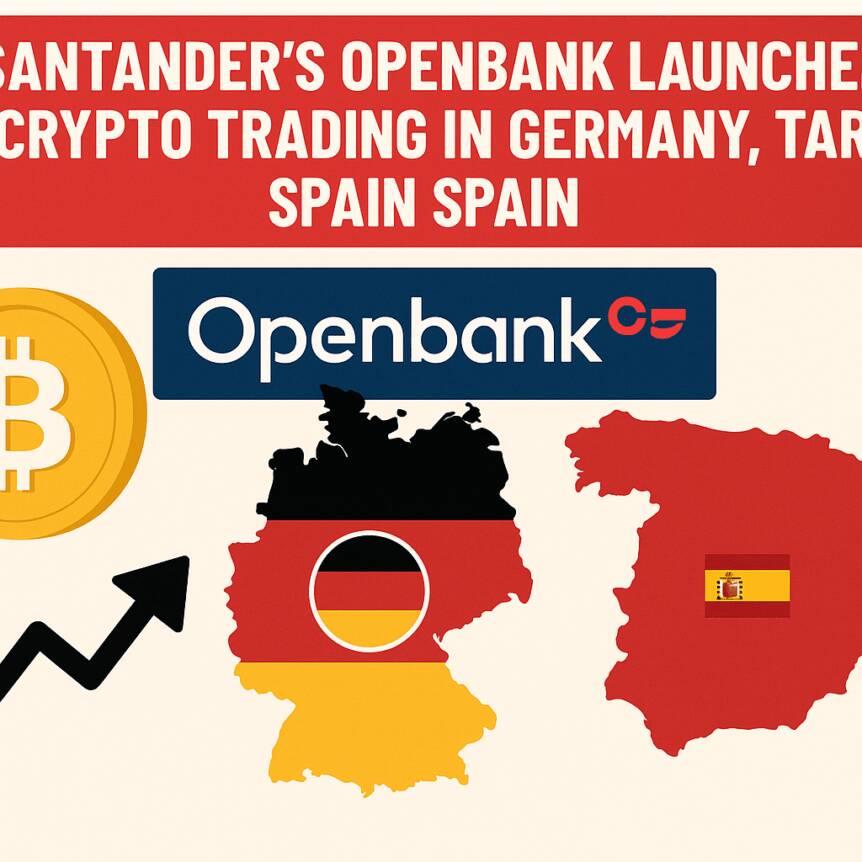Santander's Openbank Launches Crypto Trading In Germany, Targets Spain
Openbank, the fully digital subsidiary of Grupo Santander, is expanding its footprint across Europe with a new cryptocurrency trading service tailored for German clients. This move comes in response to increasing demand for digital assets and aims to provide a seamless experience for buying, selling, and holding major cryptocurrencies .
Starting this week, users in Germany can trade Bitcoin (BTC ), Ether (ETH ), Litecoin (LTC), Polygon (MATIC ), and Cardano (ADA ) directly on the Openbank platform. The new service integrates cryptocurrencies into its established suite of investment products, offering a streamlined alternative to third-party platforms while operating under the comprehensive European Markets in Crypto -Assets (MiCA) regulation framework.
Santander has outlined plans to introduce similar crypto trading features in Spain shortly, with additional functionalities such as crypto -to-crypto conversions and more token options expected soon. According to Coty de Monteverde, head of crypto at Grupo Santander, the move responds to clear customer demand for digital assets within traditional banking services.
While Openbank's entry into crypto trading is a recent development, Santander has historically explored blockchain applications, including the launch of Ripple -powered cross-border payment solutions in 2018. The bank has also expressed interest in stablecoins, contemplating issuing its own or participating in existing projects, aiming to stay at the forefront of crypto innovation.
Crypto Adoption Grows Among Germany's Leading BanksThe expansion of Santander's crypto offerings is part of a broader movement among Germany's largest banks preparing to incorporate crypto assets into their services. Notably, DZ Bank launched a crypto pilot program across 700 cooperative banks in September 2024, leveraging Börse Stuttgart Digital's infrastructure. Similarly, Deutsche Bank announced plans to establish a digital asset custody service in 2026, partnering with Austrian startup Bitpanda and Swiss firm Taurus.
Deutsche Bank's executives have also indicated interest in stablecoin markets, exploring the issuance of their own tokens or participating in existing initiatives to facilitate crypto payments and settlements.
In addition, Sparkassen-Finanzgruppe plans to roll out retail crypto trading to its nearly 50 million German customers by mid-2026, supported by DekaBank and Börse Stuttgart Digital.
These developments highlight a significant shift in Europe's traditional banking landscape, driven by regulatory clarity through frameworks like MiCA, which is fostering increased participation in the fast-growing crypto markets. U.S. banks are also ramping up their crypto initiatives, with major institutions exploring stablecoin creation and digital asset services following recent legislative advances.
Crypto Investing Risk WarningCrypto assets are highly volatile. Your capital is at risk. Don't invest unless you're prepared to lose all the money you invest.
Legal Disclaimer:
MENAFN provides the
information “as is” without warranty of any kind. We do not accept
any responsibility or liability for the accuracy, content, images,
videos, licenses, completeness, legality, or reliability of the information
contained in this article. If you have any complaints or copyright
issues related to this article, kindly contact the provider above.
Most popular stories
Market Research

- TOKEN2049 Singapore Breaks Records: 25,000 Attendees At The World's Largest Web3 Event
- Permissionless Data Hub Baselight Taps Walrus To Activate Data Value Onchain
- Newcastle United Announce Multi-Year Partnership With Bydfi
- Ethereum Meme Coin Little Pepe Crosses $25M, Announces 15 ETH Giveaway
- Canada Real Estate Market Size, Share, Trends & Growth Opportunities 2033
- Everstake Expands Institutional Solana Services With Shredstream, Swqos, And Validator-As-A-Service






















Comments
No comment